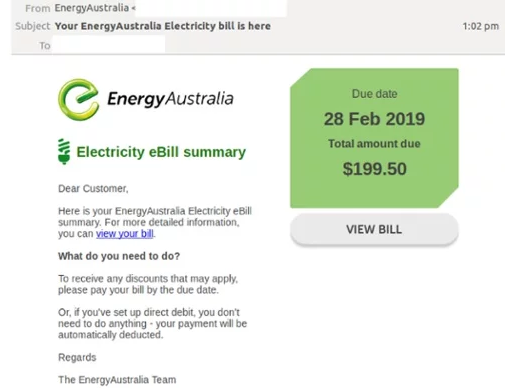Fake EnergyAustralia bills are luring Australians into trouble

Scammers are sending out emails that look very much like a bill from electricity company EnergyAustralia to land unsuspecting Australians into trouble.
The fake bill notifications started landing in inboxes on Thursday afternoon, according to cybersecurity company Mailguard.
The emails are made to look very similar to an authentic bill notice from EnergyAustralia, using the company’s green branding and logo. The sender is also named as “EnergyAustralia”.
But when the user clicks on the “view bill” button, malicious software is downloaded onto the computer.
“EnergyAustralia, by its large database and established brand credibility, is an ideal company to spoof by cybercriminals as it widens their victim pool,” said Mailguard social media manager Akankasha Dewan.
How to spot the fake
Mailguard said that the one giveaway that the email is not actually from EnergyAustralia is that it doesn’t address the customer by their name.
“The email does not address any customers directly, but instead refers to ‘Dear Customer’,” Dewan wrote.
“Such a trait is commonly observed in a typical email scam and MailGuard urges all users to be vigilant of such signs when accessing their emails.”
To avoid being scammed by a fake email, Mailguard warned Australians to delete any emails from well-known companies that don’t address you personally by name or have poor grammar.
Another giveaway is if the message offers rewards, gifts or money in return for personal details.
A link within the email that supposedly goes to their website can also be a red flag – unsure customers should go through the front page of the company.
Emails that request personal information that the company should already possess should also ring alarm bells.
Make your money work with Yahoo Finance’s daily newsletter. Sign up here and stay on top of the latest money, news and tech news.
Now read: Optus privacy breach – people see ‘Vladimir’ after logging in
Now read: BUSTED – Melbourne tradie to pay $150,000 for faking back injury
Now read: $200,000 is yours if you can hack this voting system

 Yahoo Finance
Yahoo Finance 